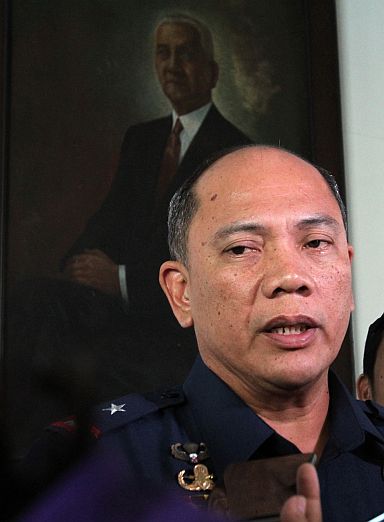‘BETTER THEM THAN US’

Chief Supt. Noli Taliño
Despite the investigation conducted by the Commission on Human Rights (CHR), policemen in Central Visayas will not go soft on criminals.
Chief Supt. Noli Taliño, director of the Police Regional Office in Central Visayas (PRO-7), said it would be better for police operatives to get the criminal offenders first rather than ending up getting killed themselves.
The official insisted that all their operations were legitimate and it just so happened that the drug pushers fought back, prompting the policemen to defend themselves.
“Dapat maunahan nang mga pulis. Ayaw natin na ang ating mga pulis ang mapatay. Sabi ni chief PNP (Philippine National Police Director General Ronand “Bato” dela Rosa), ‘When the smoke cleared, dapat ang bumulagta ay ang drug pusher, hindi ang ating kapulisan.’ Very clear ang instruction sa atin, kung lumaban, unahan na natin,” he said.
(The police should get them first. We don’t want our policemen to die. Just like what the chief PNP said, when the smoke cleared, the one who should be down on the ground is the drug pusher, not the policemen. The instruction to us is very clear: if they fight back, we have to get them first.)
Leo Villarino, CHR-7 chief investigator, on Tuesday said he received a directive from lawyer Diana De Leon of CHR’s Human Rights Protection Office in Manila last July 15, mandating the regional office to conduct a probe on what could be cases of summary executions.
So far, the Commission is investigating eight cases throughout Central Visayas, all of which involved shootouts with policemen.
Taliño said PRO-7 would open itself to an investigation even as he stressed: “But I should say those killed by our operatives shot it out with the police.”
Taliño said they would also investigate their own men linked to extrajudicial killings. At the same time, he said, they would also look into the slay of suspected criminals by unidentified assailants.
So far, however, the PRO-7 director said they found no evidence to prove that the unidentified killers of crime suspects were vigilantes.
“Vigilantism is against the law. We will not allow that,” Taliño said.
Taliño yesterday met with the different police units and other government agencies in Central Visayas, with a plan to convene the Regional Law Enforcement Coordinating Committee every month to help them address crimes, especially the problem on illegal drugs.
This developed as the Integrated Bar of the Philippines (IBP), both the national and Cebu chapters, has decried what they described as an alarming rise of extrajudicial killings in the country.
IBP Cebu province chapter president Gonzalo Malig-on stressed that policemen, as law enforcers, must uphold the rule of law.
He said there should also be no room for vigilante killings in our society as it would only lead to a breakdown in law and order.
The bigger danger, he added, would be if the public would become desensitized and would just accept that summary executions are part of the norm, like what happened in the recent spate of killings when persons, who might not even be drug suspects, were executed vigilante-style and marked with “I am a drug pusher.”
“Kung ato gud na paapilon og pulis-pulis, diha ta magkaproblema. Duna na’y breakdown ba sa law and order. It can be subject to many abuses kay dili bya na sila trained, wala sila’y accountability unya dili gyud nato mapapangita kay wa man, vigilante man ang tawag,” Malig-on said.
(If we should tolerate those acting like policemen, then we have a problem. There will be a breakdown in law and order. It can be subject to many abuses because they are not trained, they have no accountability and we can’t find them because they are vigilantes.)
Policemen getting accused of summary executions, on the other hand, would be an entirely different matter since they could be held legally liable but at the same time entitled to legal representation, even that coming from the IBP, added Malig-on.
Malig-on’s sentiment echoed that of the National IBP, which condemned extralegal killings even as it lauded the efforts of the Duterte administration to address the magnitude of the country’s drug problem.
“ . . . we are a nation of laws and not of men and, as such, must never lose sight of the very foundation of our democracy, the idea that the rule of law must prevail,” read the IBP national chapter statement released by its president, lawyer Rosario Setias-Reyes.
“It is at times such as these, when the temptation to take extralegal measure is at its height, that our conviction to abide by this principle must likewise be at its strongest,” it added.
The IBP said that regardless of whether or not the victim is a drug offender, unjustified killing is still murder.
It likewise stressed that while law enforcers have the right or authority to use deadly force to protect themselves and innocent bystanders, the abuse of this authority is equally criminal.
The IBP urged the Philippine National Police, other law enforcement agencies, and the Office of the Ombudsman to give due attention to the serious and credible investigation and resolution of these incidents and the prosecution of the wrongdoers to the full extent of the law.
The IBP statement ended by quoting the Supreme Court’s reminder in the case of Allado vs. Diokno, which read, “While the State has every right to prosecute and punish violators of the law, this does not confer a license for pointless assaults on its citizens. . . . The right of the State to prosecute is not a carte blanche for government agents to defy and disregard the rights of its citizens under the Constitution.”
Disclaimer: The comments uploaded on this site do not necessarily represent or reflect the views of management and owner of Cebudailynews. We reserve the right to exclude comments that we deem to be inconsistent with our editorial standards.
